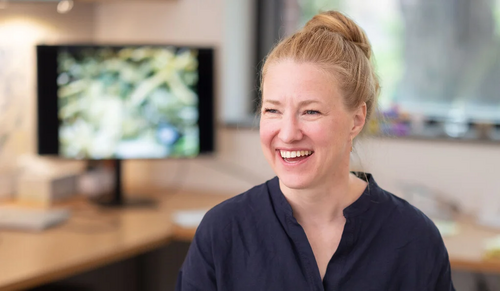
Yale experimental physicist Alison Sweeney will receive $1.25 million to fund her research that might lead to innovations in optics and solar technology.
In her research, Yale’s Alison Sweeney has crafted innovative studies that have revealed novel mechanisms in the natural world that could aid in the design of future technology. For instance, she has discovered the blueprints for possible new advances in the self-assembling proteins in squid eyes and iridescence in giant clams.
A new, five-year, $1.25 million award will help her continue this groundbreaking work.
The award is part of the Gordon and Betty Moore Foundation’s Experimental Physics Investigators Initiative, which provides flexible funding for scientists to pursue imaginative research ideas and advance scientific understanding of the natural world. This year, the initiative’s third, 20 researchers won the award.
“Throughout my career, I’ve had the most scientific success pursuing somewhat orthogonal, seemingly divergent ideas that can often be hard to fund through traditional mechanisms,” said Sweeney, an assistant professor of physics and of evolutionary biology and ecology in the Faculty of Arts and Sciences. “The ideas are surprising, and therefore require a lot of careful and creative communication to break through a review process, and it doesn’t always work.”
Sweeney will use the award funding to study proteins in squid eyes. Some scientists believe these proteins have “stealthy hyperuniformity” properties that allow squid to “self-assemble” a highly sophisticated optical system for seeing underwater.
Earlier this year, Sweeney’s lab also published new research revealing the science at the heart of iridescent giant clams’ efficiency at solar energy conversion: an intricate combination of geometry, movement, and light-scattering characteristics.
Sweeney joined the Yale faculty in 2019; she began her faculty career at the University of Pennsylvania in 2012.
One of the aims of the Experimental Physics Investigators Initiative is to support scientists who may lack flexible research funding to explore their most creative research ideas. The initiative also pays special attention to research groups that develop and reinforce practices to promote inclusion and equitable access to education and career development within the experimental physics community.
“The Moore Foundation’s vote of confidence and the opportunity they have provided will be the difference between my group continuing to pursue creative, surprising work over the next five years, versus shifting to less surprising, more established ideas,” Sweeney said. “It is a big psychological boost that the things I think are important and interesting at the interface of the disciplines of physics and evolution also matter to the larger scientific community.”
Former winners with ties to the Yale Physics Department,
2023
- Joshua Spitz, Ph.D., MPhil, and MSc Yale University; BS, University of Colorado at Boulder currently an associate professor at the University of Michigan.
- Jeffrey Thompson, Ph.D., Harvard University; MSc, Harvard University; and BS, Yale University currently an associate professor at Princeton University.
2022
- Wei Guo, Postdoctoral Associate, Yale University; Ph.D., Brown University; B.Sc. Wuhan University currently a professor at Florida State University.
This story was adapted from the Yale News story of August 21, 2024 by Jim Shelton. See below for links to the original article and other related links.